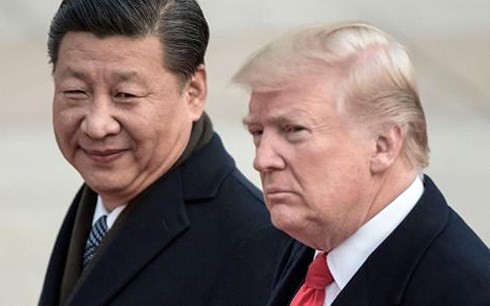(VOVWORLD) - Trade tensions over the past two months between the US and China, the world’s two most powerful economies, have negatively impacted the global economy. Some major stock markets have stumbled and currencies have devalued against the USD.
 Chinese President Xi Jinping and US President Donald Trump Chinese President Xi Jinping and US President Donald Trump
|
US-China trade tensions are the current biggest obstacle to global economic growth and globalization. Trade the world’s two biggest economies affects other economies and their tit-for-tat tariffs could ignite a global trade war.
Negative impacts on many markets
The currencies of China, India, Indonesia, Myanmar, and several other countries have devalued. Since June, the exchange rate of India’s rupee has dropped to a new low. China’s yuan has declined 3.2%. Investors’ hesitation to spend money in Asia is seen as the key factor in currency devaluations in the region.
Although the won has not devalued, South Korea has been severely hurt by the US-China trade war because they are South Korea’s two biggest trading partners. A report by South Korea’s International Trade Association forecasts that its GDP will shrink 0.018%, equivalent to 236 million USD, in the coming year if the US and China maintain a 25% tariff on 50 billion USD worth of each other’s commodities. Taiwan, China, will see its GDP shrink an estimated 0.025%. Canada, Mexico, and Ireland will also suffer. The GDP of the US and China will fall 0.1% to 0.2% if trade tensions continue to increase.
Response
Some economists doubt that the devaluation of Asian currencies will reach a crisis level. Monetary agencies in Asia have drawn lessons from currency devaluations in 2013, 2015, and 2016 and are reacting quickly. Indonesian agencies have increased interest rates 4 times in 3 months. India and Philippines have also raised interest rates. Several Asian countries have increased their foreign currency reserves and are doing a better job of controlling their budget deficits.
Other economies, such as South Korea, have reduced their dependence on China and the US and have expanded trade ties with India and ASEAN countries. South Korea’s Ministry of Commerce will help Korean businesses penetrate other markets.
American and Chinese negotiators are scheduled to meet on Wednesday and Thursday to discuss current trade disagreements. President Donald Trump and President Xi Jinping are expected to meet at the Asia-Pacific Economic Cooperation Meeting in the middle of November in Papua New Guinea, and at the G20 summit in Buenos Aires, Argentina, in late November. Meanwhile, the imminent global trade war is expected to slow down global GDP growth 1 to 3% in the next few years.